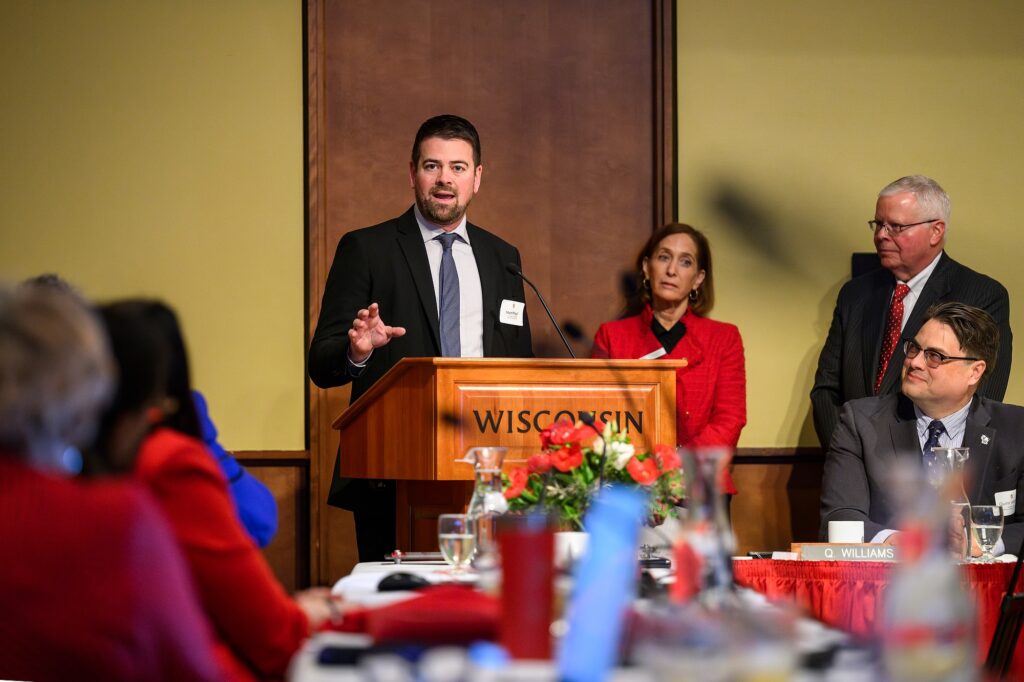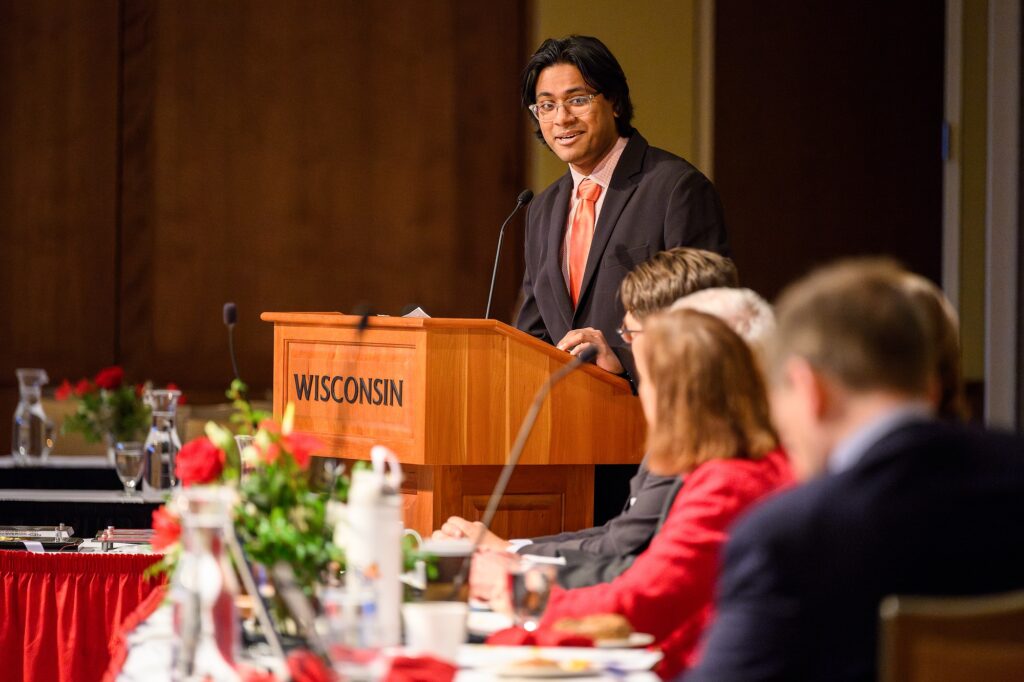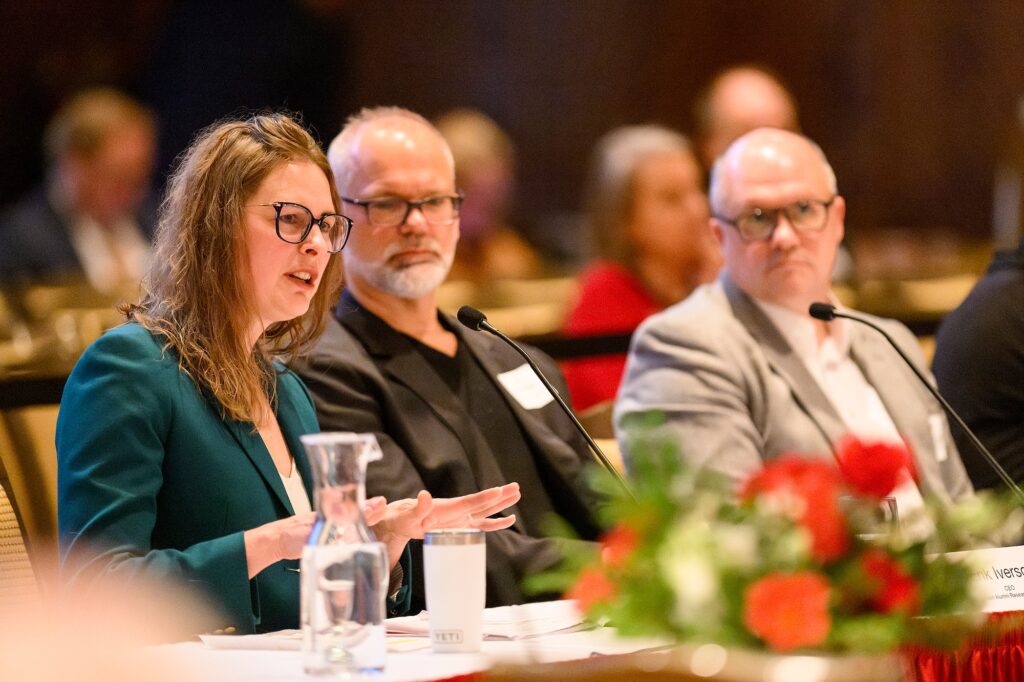
Matt Maryl, vice president for strategy performance & partnerships at American Family Insurance, speaks as his company and the UW–Madison were awarded the Regent Business Partnership Award during the Board of Regents meeting hosted at Union South at the University of Wisconsin–Madison on Feb. 7, 2025. The Regent Business Partnership Award was created several years ago to highlight the mutually beneficial relationships between the Universities of Wisconsin and Wisconsin’s business community. (Photo by Althea Dotzour / UW–Madison)
MADISON, Wis. – Regent President Amy Bogost today presented University of Wisconsin–Madison and American Family Insurance with the latest Regents Business Partnership Awards. The awards were created several years ago to highlight the mutually beneficial relationships between the Universities of Wisconsin and Wisconsin’s business community.
“This is a decades-long partnership that spans a broad range of collaborations between our flagship and this well-known, Madison-based national business,” Bogost said.
Calling the university’s work with American Family “an exceptional partnership,” UW-Madison Chancellor Jennifer Mnookin noted the broad array of areas where the two organization intersect.
“These collaborations fuel so much,” she said. “They fuel innovations that drive economic growth and change lives in Wisconsin and all around the country. They keep us focused on those needs in really direct and explicit ways. They strengthen our workforce engagement and bring new ideas to us as well. Many of our partners in industry focus on supporting our research. Some help us build our community outreach. Some support athletic programs and student scholarships. And then we have a few partners who do all of the above and more. And AmFam is one of them.”
“What’s unique about this is that it’s the marriage between two really preeminent institutions, institutions with local history but punching above their weight nationally with exceptional national reputations,” said Matt Maryl, Vice President for Strategy Performance & Partnerships at American Family Insurance.
Maryl added that American Family has also benefited extraordinarily from a pipeline of talent produced by UW-Madison, ranging from interns up to the very highest levels of the organization.
Universities of Wisconsin President Jay Rothman also called out that pipeline. “Our ability to be able to partner with businesses like American Family is absolutely critical to power up the workforce pipeline that is so important to keeping Wisconsin economically vibrant and secure. From my perspective, it’s great to see two iconic institutions in both the UW-Madison and American Family work together.”
UW-Madison Student Spotlight

Shantanu Chaudhuri, student spotlight speaker and UW–Madison undergraduate student, speaks during the Board of Regents meeting hosted at Union South at the University of Wisconsin–Madison on Feb. 7, 2025. (Photo by Althea Dotzour / UW–Madison)
In the host campus Student Spotlight, Shantanu Chaudhuri, a senior majoring in computer engineering and computer science, told Regents that the UW-Madison had been his dream school for as along as he could remember
“In my coursework, I feel challenged in every single class,” he said. “Every bit of learning is earned. But what makes UW-Madison truly exceptional is not just the academics. It’s the way that this institution teaches us how to navigate the world and how to find meaning in the communities we build.”
Chaudhuri, who was born in India but has called Grafton, Wis., his home since 2013, said being part of the Wisconsin Union Directorate – and eventually its president – has been the highlight of his Badger experience.
“My story is a testament to the transformative power of community,” Chaudhuri said. “Identity isn’t something you stumble upon overnight. It’s something you build through experiences, relationships, and the courage to be yourself. And it flourishes when you’re surrounded by people who believe in you. To me, UW-Madison isn’t just a world-class academic institution. It’s a place where I learned to be comfortable with my identity. It’s where I found my community, and it’s my experiences here that have shaped my purpose. And for that, I will always be proud to call myself a Badger.”
Empowering Innovation and Entrepreneurship

Jessica Martin Eckerly, CEO and cofounder of Forward BIOLABS, speaks during a panel presentation “Empowering Innovation and Entrepreneurial Excellence” during the Board of Regents meeting hosted at Union South at the University of Wisconsin–Madison on Feb. 7, 2025. (Photo by Althea Dotzour / UW–Madison)
While UW-Madison has long been a thriving hub of innovation and entrepreneurial excellence, the university is currently positioning itself to further strengthen entrepreneurial pathways, experiences, and outcomes, drawing on the findings and recommendations of a study recently commissioned by Chancellor Mnookin.
Panelists with direct experience with entrepreneurship at UW-Madison participated in a discussion and shared their stories of impact and perspectives on the university’s new strategy and how innovation and entrepreneurship are vital for economic development.
“Our strategy is to shift and focus on founders, the people that create and build companies,” said Jon Eckhardt, Special Advisor to the Chancellor for Entrepreneurship. “We want to recruit them into the state of Wisconsin and from across our state, and help them develop as entrepreneurs, and develop their ideas into companies while they’re here. Lastly, we want to help them launch entrepreneurial careers in companies.
“We can help our economy innovate and foster job creation through entrepreneurship,” he added. “The best research shows that new firms are typically the drivers of the employment growth in the U.S. economy and the UW can and does play a fundamental role in activating entrepreneurship in the state.”
Eric Iverson, CEO of Wisconsin Alumni Research Foundation, told Regents that WARF receives about 400 new inventions from across campus each year. “That is an incredible output of intellectual prowess,” he said. “To make humankind and the environment better, that’s our mission. And in that process, if we make some money in the form of royalties, we will give those back over to the campus in the form of grants. That’s what we do.”
Keiran Furlong, co-founder of Realta Fusion, a fusion energy start-up in partnership with UW-Madison, credited the university and WARF for being foundational for the company. “It’s a bold statement of fact to say that without UW-Madison and without WARF, Realta Fusion would not exist,” he said. “The jobs we’re creating would not exist. And the millions of dollars that we’re bringing into the state and the university is inward investment that would not exist either.”
Helping to nurture a thriving entrepreneurship environment in the Madison area, Jessica Martin Eckerly, CEO and co-founder of Forward BIOLABS, explained how her company provides a co-working lab for early-stage companies.
“We operate this life sciences laboratory that allows a company when they’ve got an idea, the technology, to raise much less capital. They can bring their scientists into our lab and begin experimenting in just a couple weeks. Normally this process would be serval months. So it expedites their ability to get their company started but we lower the barriers for them.”
Eckerly said that in six years, Forward BIOLABS has served over 50 companies and those companies have amassed over $400 million in investments and grants. “And what happens is those investments allow our companies to hire people, to hire students,” said the UW-Stevens Point alumna.
Panelists emphasized the key role of access to capital.
Wes Schroll, CEO and founder of Fetch, said it’s important to raise the profile of what UW-Madison does for entrepreneurship to support attracting both students and investors into Wisconsin. “It shouldn’t be luck,” he said. “It should be something that is very purposeful that people across the country know that UW stands behind entrepreneurship, supports entrepreneurship, and there’s been a lot of successful entrepreneurs that have come out of it.”
Furlong noted that since he came back to Wisconsin in 2019, he’s heard lots of talk about not enough venture capital in the state.
“That’s not the problem. The problem is access,” he said. “Venture capital is still a cottage industry. It’s a very closed industry. The way you get in there is with connections, with experience. I will also say that investment finds good ideas and good teams addressing a market need.”
Panelists noted the contributions of WySis to the state’s entrepreneurial culture. It was also pointed out how UW-Madison’s RISE initiatives provides a platform to begin prioritizing certain research activities.
Regent Vice President Kyle Weatherly questioned how entrepreneurs can be better developed while at the university.
Eckhardt said the strategy is to have a portfolio of programs to make all kinds of different experiences available to explore an interest in entrepreneurship. That includes offering opportunities for people to explore entrepreneurial interest later in life, not just while they’re college students, he added.
“The philosophy here is we want to lean into one of our core capabilities of a university, which is we attract people from all over the world and all over Wisconsin to come here to build the next stage of their life as their career,” Eckhardt said. “The second thing is, to be successful we also need to leverage all the expertise outside the institution that we possibly can.”
ATP Update
The executive sponsors and executive director for the Administrative Transformation Program (ATP) provided Regents with an update on the implementation status and overall readiness of the project to go live in July 2025.
ATP is “an ambitious but necessary modernization project to tackle the unsustainable level of complexity in the current administrative environment across the UWs,” said President Rothman. “Addressing that reality is embedded in our strategic plan priorities as well as being just plain common sense. What I’m particularly looking for is getting data in real time.”
- See the ATP update PowerPoint
ATP is expected to standardize processes, organize roles, and modernize technology with Workday cloud-based enterprise resource planning software.
Regent Emeritus Recognized
Regent Emeritus Bob Atwell was recognized for his seven years of service on the UW Board of Regents, from 2017 through 2024. His 34 years of experience as a banker in the state of Wisconsin contributed to his strong advocacy for financial transparency and thoughtful stewardship practices during his tenure on the board.
Regent Karen Walsh, who presented the resolution, said that when having discussions about what the future of the UWs might look like, “It gave me some comfort to know that Bob was at the table,” she said. “Bob knows us well. He knows the system well. And he also constantly pushed for more financial oversight and more financial budgeting that made sense.”
Atwell said one of the best parts of his Regent journey was getting to know his colleagues. “This has been a rich personal experience made richer by many of you in this room.”
He acknowledged that he’s been critical of much that goes on within the UWs. “Now that I’m in the fourth quarter of my game clock, it’s a great season to reflect on the things that I once firmly believed,” Atwell said. “Among the most essential skills in life was to be willing to try things. To be willing to be wrong. And self-reflective enough to recognize when you are wrong. What applies to me also applies to the UW. We need to be more humble. More self-reflective, more generous and willing to admit our screw-ups and correct course.”
Atwell noted that the UWs are once again in a state budget battle with very high stakes and also subject to the rapid changes in federal policy. “None of this is easy,” he said. “But adversity holds much opportunity. And it falls to the people in this room to find the opportunity in these problems. We will be well served by rediscovering that the core purpose of this university system is to seek truth and to serve all the people of this state.”
In other business, the Regents:
- Approved a resolution of appreciation for UW-Madison’s hosting of the February 2025 Board of Regents meeting;
- Approved UW-Eau Claire’s request for a Bachelor of Arts and a Bachelor of Science in Artificial Intelligence;
- Approved UW-Green Bay’s request for a Bachelor of Arts in Criminal Justice;
- Approved UW-Madison’s request for a Master of Fine Arts in Dance;
- Approved UW-Madison’s request for a Bachelor of Science in Plant Science and Technology;
- Approved UW-Madison’s request for a Master of Science in Learning Analytics;
- Approved UW-Milwaukee’s request for a Bachelor of Science in Medical Laboratory Science;
- Approved UW-Parkside’s request for a Bachelor of Science in Neuroscience;
- Approved UW-Stout’s Revised Faculty, Academic Staff, and Limited Appointees Handbook (FASLAH);
- Approved an agreement on behalf of UW-Milwaukee with ReUp Education;
- Approved a memorandum of agreement on behalf of UW-Milwaukee regarding the naming of laboratories in recognition of a $2 million private donation made to the UWM Foundation to support the Great Lakes Research Vessel Construction Fund for the School of Freshwater Sciences;
- Approved the UW Status Report on Large or High-Risk Information Technology Projects;
- Approved the annual report on the Strategic Plans for Major IT Projects;
- Approved UW-Green Bay’s request for authority to sell approximately 80 acres of vacant land located in Door County;
- Approved UW System’s request for authority to construct two All Agency maintenance and repair projects, including the Multi-Building Emergency Generator Replacements project at UW-Stevens Point and the West Campus Electrical Substation Renovation project at UW-Madison;
- Approved revision to the Audit Committee charter and approved revisions to the bylaws of the Board of Regents to rename the Audit Committee. The new name is now Audit, Risk, and Compliance Committee; and
- Approved update to the Office of Internal Audit charter.
The next meeting of the Board of Regents for the Universities of Wisconsin will be a virtual meeting on March 6, 2025.
